- Home
- Octavia E. Butler
Survivor Page 2
Survivor Read online
Page 2
“So,” he said softly. “You understand.” And he leaned back, looked at her curiously, appraisingly, letting her know the subject of his next words before he spoke them. Her husband…
“I try to imagine what kind of Tehkohn man would accept you in a liaison,” he said. “And how such a man might feel when he learned that you carried his child and the liaison had become a marriage. Which clan does your husband belong to?”
“He’s a judge.” She was careful to say the words with the proper amount of pride and disdain. Judges were, among other things, lawgivers, advisers to rulers, and sometimes, rulers themselves. The judge blue-green could have accounted for the lack of yellow in Tien’s coloring. It did not, but it could have.
“A judge.” Natahk seemed to believe her. “We have captured four judges, we lowly hunters. Four judges and a Hao!” He shimmered, gleefully luminescent, and turned to look at the prisoners. Most of them were half covered with a red paint made especially for shaming enemies, criminals, and prisoners of war. With prisoners, it also served to neutralize their camouflage ability. No red-painted captive, even if he escaped his captors, could hope simply to fade away into the woods. Red was too rare a color aboveground in both the mountains and the valley. No matter how well the unpainted parts of a prisoner’s body blended with his background, the red blazed forth to reveal him.
“I wonder,” said Natahk, “whether we have captured your husband.”
“You haven’t,” she said shortly. Another lie—but this time, perhaps only half a lie.
“So? But I’ve watched you, Alanna. The way you look at the prisoners. The way you avoid looking at the prisoners. Your face shows more than fear and painful memories. Yes, I think we’ve captured him—or driven him into the hands of the Missionaries. Is he their one crippled judge?”
She realized peripherally that the Missionaries’ lone judge must have been the one with the broken arm and the long red gash in his forehead.
“Which is it?” asked Natahk.
Alanna said nothing.
“If you have feeling for the man who fathered your child, you’ll tell me. If he belongs to the Missionaries, I can speak to Verrick, perhaps make a trade. He would be safer in my hands. I know better than to kill my prisoners. The Missionaries may not.” He paused, trying to read her carefully expressionless face, then went on. “In the southern end of this valley, there is another Garkohn town.”
“A town of farmers,” said Alanna. “I know.”
“Mostly farmers, yes, and some hunters to defend against animals and raiders, and to get meat. I’m First among them too. I could make a place there for you and your husband to resume your lives together.”
Alanna smiled grimly. “My husband is not a captive, hunter.”
He looked doubtful. “If you are telling the truth, you may be less fortunate than you think. You may have no other chance for reunion with him.”
“Reunited to live as Garkohn, our loyalties ensured by the meklah?”
“That is our way, Alanna.”
“And I have said what I thought of that ‘way.’”
“Oh yes. Death would be preferable.” He rose to his feet. “Stand up.”
She obeyed slowly, suspiciously, taking real comfort in the fact that she was still within sight of the Missionaries.
“Walk with me. I have something to show you.”
She stayed where she was. Now she had reason for her fear. “Then bring it to me, Natahk.”
He laid a hand on her shoulder. The companionable gesture had a meaning all its own among the Kohn. It was as much a threat as a raised club. “You will come with me now or later,” he said. “It makes no difference.”
She looked around desperately, not knowing what to do. Whatever he had in mind for her would no doubt be worse if she made him wait and abduct her. She could not call on the Missionaries for help. And the other who had an interest in her welfare, her husband, was in no position to help her. He should not have been a captive, probably would not be one long, but he was one now, and that meant he had problems of his own.
She told herself that Natahk would not dare do her any real harm. Hurting her would lose him the friendship of the Missionaries, and for some reason he had gone to great trouble to maintain that friendship. Surely whatever satisfaction he might get from hurting her was not worth its loss. She followed him, holding that thought.
Natahk led her by the arm as though he was afraid she might suddenly change her mind and try to go back. When she saw the heavily laden meklah tree that he was leading her toward, she did exactly that. But by then, it was too late.
She panicked, twisted away from him, ran a few steps. She was quick—easily quicker than most hunters, she knew. But Natahk was not an ordinary hunter. He caught her arm and she kicked at him. But she was off balance. He dodged easily. He jerked her to him, twisted her arm behind her. His other arm clamped across her throat painfully, cutting off her breath.
“You’re being foolish, Alanna,” he said quietly. “What would you have done if you had managed to break away? Where would you go to escape me?”
She could not answer. She stood bent slightly backward against him by the pressure of his arm across her throat.
He pushed and guided her the rest of the way toward the tree, then spoke quietly into her ear. “What I intend to show you is a truth about yourself. I cannot believe that a Missionary can become Tehkohn in only two years. Now many Tehkohn would truly prefer death to the meklah. I know because I have watched them starve themselves to death when they realize that they cannot escape—that death is the only alternative to becoming Garkohn. But I have never seen Missionaries deliberately kill themselves for any reason.” He moved his arm from her throat and suddenly she could breathe again. As she stood gasping, she felt his hand caress her throat, now obscenely gentle. “Pick a meklah fruit and eat it, Alanna, or I will kill you.”
She started to speak but he raised his hand to touch her mouth.
“Make no pleas and no outcry. Do exactly as I say, and you will live. Do anything else, and you will die. Now. Pick the fruit.”
One small fruit. Only one. It seemed so harmless. Yet the Tehkohn had warned her, She had been addicted once. Even one fruit would mean readdiction.
She had watched a room full of people, Missionary and Garkohn, die very slowly in meklah withdrawal. She had not been able to watch too carefully because she had been in withdrawal herself. For days, she had been near death. She could no longer remember all that had happened to her during that time, but she remembered the pain.
Her hand seemed to reach up against her will to pick a ripe yellow fruit.
She looked at the fruit and wondered whether it would kill her this time the way it had killed the others. Because she would have to withdraw again. She would have no choice.
She bit into the fruit, found it firm and sweet, delicious against all reason. No wonder the Missionaries had welcomed it so warmly when the Garkohn introduced them to it. It had been one of the first gifts of the Garkohn to the new colonists three years before. The Mission doctor had tested it and declared it safe to eat. No one had thought that it might not be safe to stop eating.
She finished the fruit and the Garkohn released her. She did not move, did not even turn to look at him. “When the Tehkohn come to kill you, Natahk, I hope they do it slowly. I hope they take away your meklah and let me watch.”
“So?” He smiled again grotesquely. “You should use your time thinking of things that are possible. Your husband, for instance, freed and cleansed of the red stigma.”
She ignored him, started to walk back to where the raiding party rested. He moved after her quickly.
“Why do you continually force me to threaten you?”
“What more do you think your threats can do?” Her voice was flat, dead. “I’ve told you that you don’t have my husband. You can’t force me to point out someone who isn’t a captive. If you try, I’ll choose one of your judges and claim him to please you
. And you will be pleased with a lie.”
She walked faster and left him behind. He did not call her again. She skirted widely around the prisoners and returned to the Missionaries, who were just preparing to resume their homeward march.
CHAPTER TWO
Alanna
We were busy cannibalizing the ship, clearing land, and building our cabins when I decided to learn the Garkohn language. It bothered me, frightened me to live among people I couldn’t understand—especially since they were learning to understand us so quickly. To the disgust of several Missionaries, Jules not only agreed with me, but he lessened my share of the work so that I would have time to learn.
Next, I had to find a teacher. I asked around. Missionaries were often approached by Garkohn who had been ordered by their leader Natahk to learn English. Most Missionaries did not want to learn the Garkohn language, but sometimes they condescended to teach English. Industriously, the Garkohn learned. Now, I was told that there was a persistent huntress who had been living in the woods near our settlement for days trying to get someone to teach her. A Missionary man pointed her out to me.
She was sitting on the thick exposed root of a meklah tree. Such trees spread some of their roots vinelike over the ground until they found open sunlight. Then they anchored themselves to the ground and began growing into new trees—or new extensions of old trees. Aboveground, much of the valley was covered with roots as thick as the bodies of two or three men. Missionaries had blasted loose many of them. The Garkohn had watched the blasting with fascination.
Now though, the Garkohn woman I wanted to talk with was leaning back watching nothing at all. The coloring of her legs and lower torso blended into the rich yellow-brown of the wood she was sitting on so that she appeared to be growing out of it. Unconscious camouflage. Already we Missionaries had seen it too often to be surprised by it.
I walked over to the woman and when she saw me she stood up, her coloring darkening to its normal deep green. She was tall—only half a head shorter than I was—and even then I knew that because of her coloring she ranked high among her people. Her body was straight and stocky and her eyes were wary. She examined me as closely as I was examining her.
“Alanna,” I said, raising my hand to my chest. “Toh Alanna. Ehtoh kai?” I had learned that much just from living around Garkohn for two of Jules’s thirty-day months. On a world without a moon, Jules had decided to stay with thirty and thirty-one-day months at least for a while.
“Ah,” the woman said. “Toh Gehl.” She was silent for a moment, then said my name. “Ah-la-na?”
It was a start. I took her arm and sat down, pulling her down beside me. The Garkohn seemed always to be touching each other so I did not expect her to be offended. I was surprised, though, at the hardness of her muscle beneath her soft fur.
She caught my hand as I released her and looked at it, examined it really, seeing how much longer my fingers were than her own, bending my fingers at the joints, testing the strength of my fingernails. She brushed a furry finger over the short sparse hairs that grew out of the back of my hand.
Then she held my open hand flat between her own two and shook it once. “Tahncheah,” she said. Then she repeated it more slowly. “Tahn.” She grasped my fingers alone. “Tahn.” And she made a tight fist of my hand. “Cheah.” She let go of me for a moment and struck her open palm with a closed fist. Then she held up the fist. “Cheah.” And then the open hand, “Tahncheah.” She whitened slightly and extended one of her hands for me to examine.
I took it, smiling to myself. We were going to get along, Gehl and I. We would teach each other.
Every day we met at that tree root as the Mission settlement took shape around us. When we were communicating fairly well, I in Garkohn and she in English, she began bringing a hunter to her lessons. The two were almost identical. Later, I noticed that Gehl was darker, slightly more blue, but at first, I could tell them apart only when the hunter sat so that his genitals were visible. It was this man—Ihiateh, his name was—who taught me that Garkohn men were not as poorly endowed sexually as most Missionaries thought. Their genitals were simply more protected within their bodies than were those of Missionary men.
Ihiateh was Gehl’s temporary husband and once as the two sat talking with me, the huntress said something to arouse him. She spoke to him in a quick aside that I did not quite hear. Whatever the words were though, they gave Ihiateh an erection that no Missionary man would have had reason to be ashamed of. I stared at him in surprise, then sat back waiting to see how they would handle the situation. I had already heard much from other Missionaries about Garkohn lasciviousness and immorality.
Gehl went white with what seemed to be amusement. Ihiateh spoke sharply to her, then caught her arm and dragged her off into the woods.
The next day, Gehl came to me alone and immediately began questioning me in her careful English.
“You have no man?”
I shook my head. She had learned to interpret the gesture. “Not yet. I must choose very carefully before I accept a man because by our custom, I would have to go through a ceremony with him and be as firmly tied to him as you would be to Ihiateh if you and he had a child.”
Flecks of yellow mixed strangely with Gehl’s deep green. She glowed slightly, making an iridescence. Doubt. Confusion. “You have a ceremony before there is a child?”
“Yes. Before the man and woman are even permitted to…” I frowned. I was speaking Garkohn and she English as usual. I had no word now though for what I wanted to say. “How do you say, to come together as with a man and woman, to…?”
“To mate?” she said in Garkohn. It was exactly the same word I had heard her use in referring to animals. I had known it, but had not realized that it should also be applied to people. The Missionaries made careful distinctions in English. Animals mated or bred. Humans obeyed the first commandment of God: “Be fruitful and multiply.”
“Mate,” I said. “Yes.”
“But so often a union is childless… What do your people do? Must a man and woman stay together in sterile union?”
I thought about that and found myself wondering whether she was inadvertently telling me the reason for some of what the Missionaries called Garkohn immorality—the frequent coupling and uncoupling of Garkohn adults. Perhaps what the Missionaries had seen as a matter of morality was more a matter of necessity. Perhaps the Garkohn were just not as fertile as the Missionaries.
“They would not be held permanently in such a union,” I said. “But they would have to stay together long enough to be certain that their union was sterile. They are joined by our law. They are not permitted to seek other partners until their union is dissolved by law.”
Gehl flashed yellow disapproval. “I would not like to be trapped in such a union. Will you choose a man soon?”
I shuddered. I was young and could get away with my disinterest in Missionary men now. They were certainly not interested in me. They had been during my early days among them when I had known no better than to go with them to secret places where we could break Mission law together. I stopped that as soon as I understood that I was risking the comfort and security that I had found with the Verricks—as soon as I understood that the men and I were “behaving like animals” together instead of marrying and keeping true human tradition. Then the men and I had no more interest in each other. There was no one of them that I wanted a marriage with, and now they pretended to find me contemptible because I was not “pure.” I had shared pleasure with some of them. I was guilty of sin, but somehow, they were all still innocent. Foolishness! It disgusted me to think I would have to spend my life with anyone so foolish.
“I’m in no hurry to choose a man,” I told Gehl. “I don’t want to be trapped either.”
“I will break with Ihiateh soon,” she said. “Natahk has asked me to come to him.”
“Gehl, will you help me learn to hunt?”
Her narrow eyes widened, and for the first time, her furry face see
med to show expression. Surprise. “To hunt?” she said. “But you have food. There is meklah over all the valley, and we bring you meat. And in time, you can kill some of your own animals and plant your own crops.”
“It will be awhile before we can slaughter many of our animals,” I said. “And though it is good of your people to help us, bring us meat, we should learn to help ourselves. We should learn what we can of your ways of hunting just as we learn to speak with you.”
“Most of your people are not learning to speak. We learn your English.”
“Then we should change.”
“You need not. We are content and your people are content. Why should there be change?”
“Will you help me learn to hunt?”
She gazed downward, answered softly. “No. Natahk has forbidden it.”
“Forbidden…”I frowned. “Why?”
“He has not said.”
She was lying. There was no new yellow in her coloring but there was suddenly an odd tension in the way she held her body. She was suppressing emotion, holding her coloring normal as Missionaries might hold their faces placid in spite of fear or anger. But I knew her well enough now to see through the deception.
“I speak your language well enough now,” she said. “I think we need not meet again.”
I stared at her. In spite of whatever had suddenly fallen between us, I had come to think of her as a friend. I had felt more comfortable with her in the short time that we had been meeting than I had felt with many of the Missionaries after three years. She was more like me somehow. Freer, less concerned with appearances.

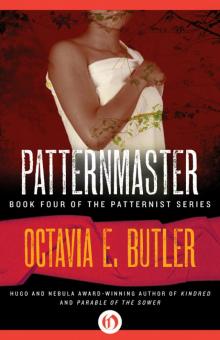 Patternmaster
Patternmaster Survivor
Survivor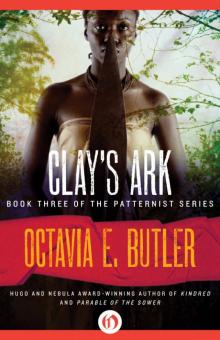 Clay's Ark
Clay's Ark Bloodchild and Other Stories
Bloodchild and Other Stories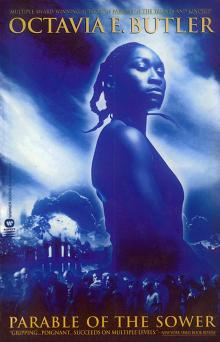 Parable of the Sower
Parable of the Sower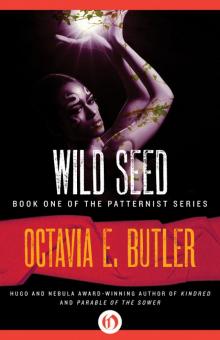 Wild Seed
Wild Seed Fledgling
Fledgling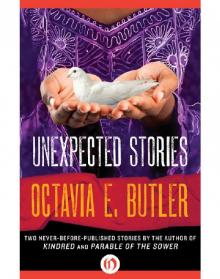 Unexpected Stories
Unexpected Stories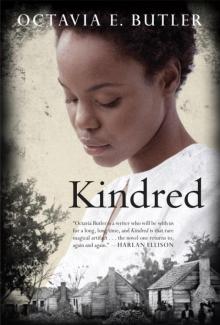 Kindred
Kindred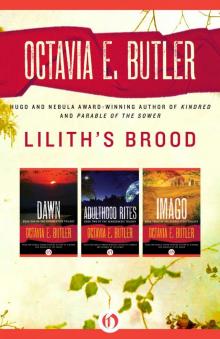 Lilith's Brood: Dawn / Adulthood Rites / Imago
Lilith's Brood: Dawn / Adulthood Rites / Imago Adulthood Rites
Adulthood Rites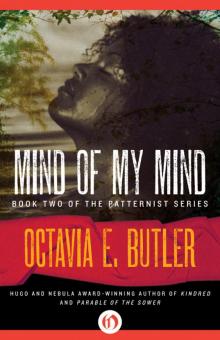 Mind of My Mind
Mind of My Mind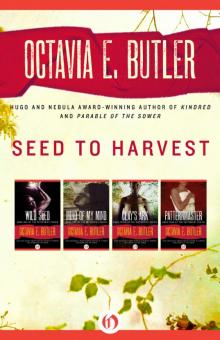 Seed to Harvest
Seed to Harvest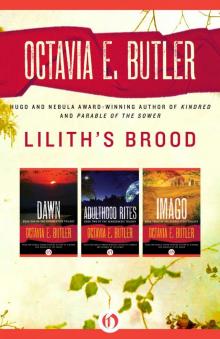 Lilith's Brood: Dawn, Adulthood Rites, and Imago (Xenogenesis Trilogy)
Lilith's Brood: Dawn, Adulthood Rites, and Imago (Xenogenesis Trilogy) Bloodchild
Bloodchild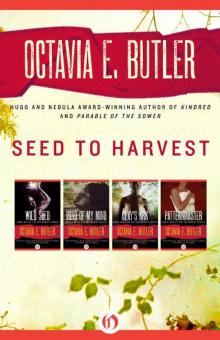 Seed to Harvest: Wild Seed, Mind of My Mind, Clay's Ark, and Patternmaster (Patternist)
Seed to Harvest: Wild Seed, Mind of My Mind, Clay's Ark, and Patternmaster (Patternist)